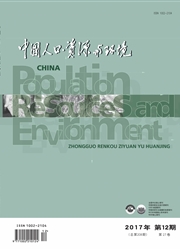

 中文摘要:
中文摘要:
人类的行为时刻在影响着生态系统。或积极,或消极。选择人均能源生态足迹(包括煤、焦炭、燃料油和电力等)作为代表生态阈值的指标。以能源消耗弹性系数代表人类对生态系统的消极影响,构造环保投资弹性系数代表人类对生态系统的积极影响,运用灰色系统方法。研究生态系统与行为系统之间的相互作用关系。分别测算上海市1978-2010年的能源消耗弹性系数、环保投资弹性系数与人均能源生态足迹的灰色关联系数,结果表明,电力是与能源消费关联最密切的因素,也是影响环保投入产出效率的最重要指标。研究发现,人类消极行为对生态系统的影响大干积极行为。从环境治理政策的角度来说。“节能”的效果远大于“减排”。在当前发展阶段,有序约束人类行为以减少对环境的消耗和破坏已迫在眉睫。
 英文摘要:
英文摘要:
Human behavior has both positive and negative impacts on ecosystem. To study the interaction between ecosystem and behavior system, percapita energy ecological footprint (percapita EEF) is selected as the indicator of ecosystem threshold. The composition consists of electricity, fuel oil, coke and coal. Elasticity Coefficient of Environmental Investment (ECEI) and Elasticity Coefficient of Energy Consumption (ECEC) are respectively representing as the indicators of positive and negative human impact on ecosystemGrey correlation coefficients between ECEC, ECEI and Percapita EEF in Shanghai of China are calculated from 1978 to 2010. Results show that electricity footprint is the most important factor of energy consumption growth and the highest effective indicator of environmental capital inputoutput. The conclusion is that negative behavior of resource consumption has a closer impact on the ecosystem than positive behavior of environmental protection. From the perspective of environmental governing policy, “energy-saving” is more effective than “emission reduction”. Reducing the negative activities is imminent in the current process of development.
 同期刊论文项目
同期刊论文项目
 同项目期刊论文
同项目期刊论文
 期刊信息
期刊信息
